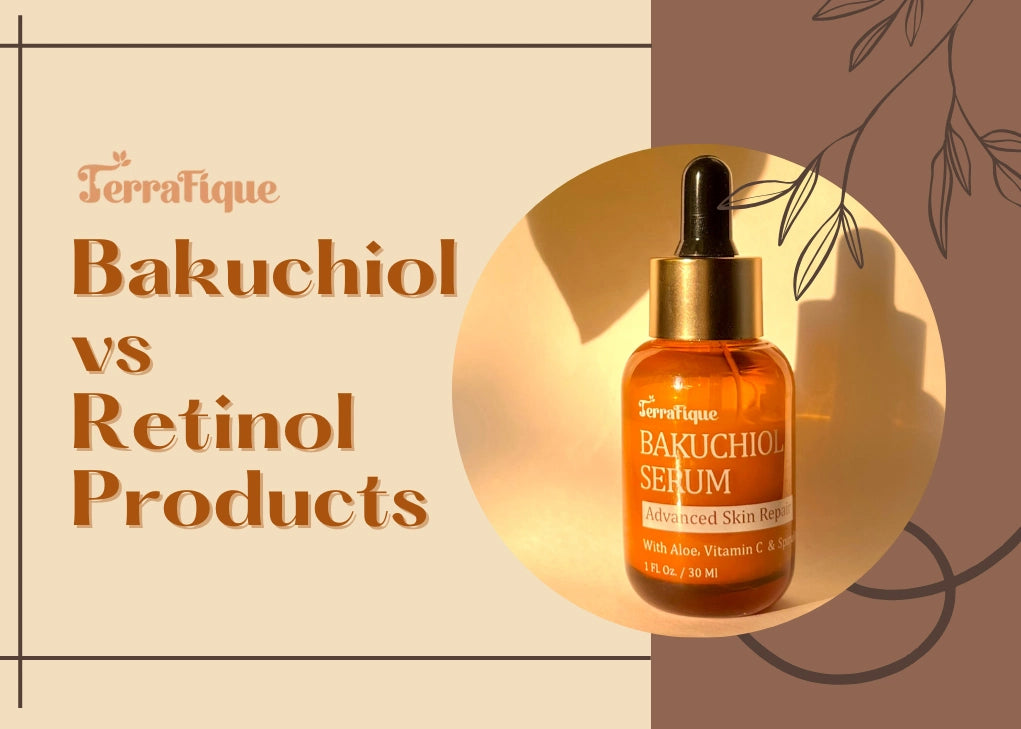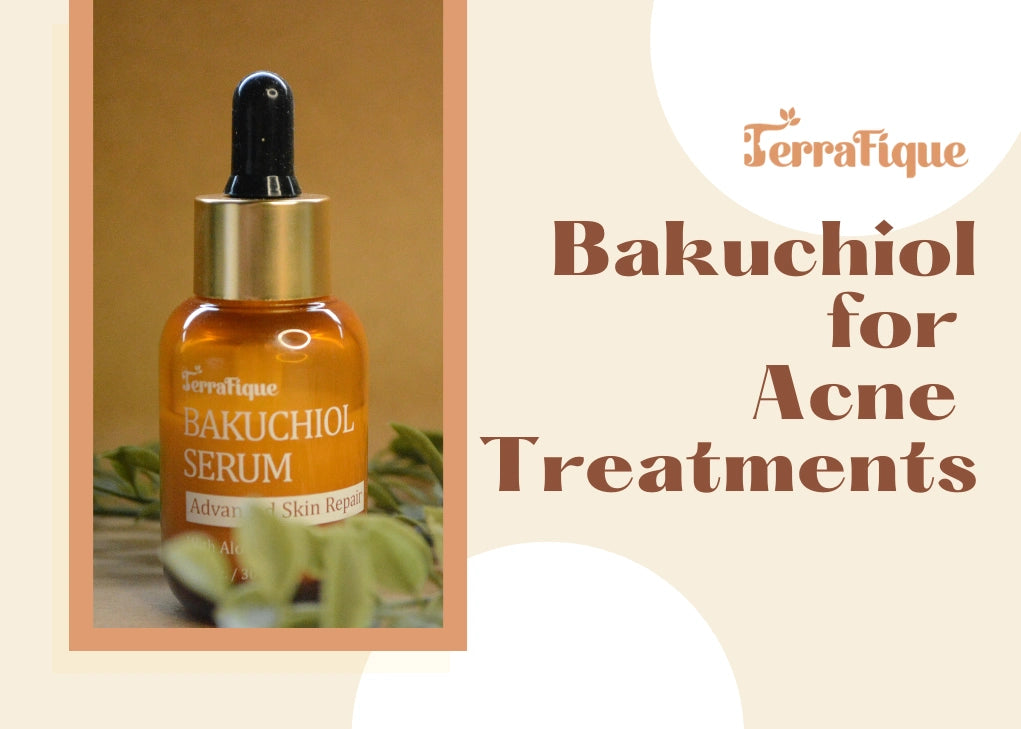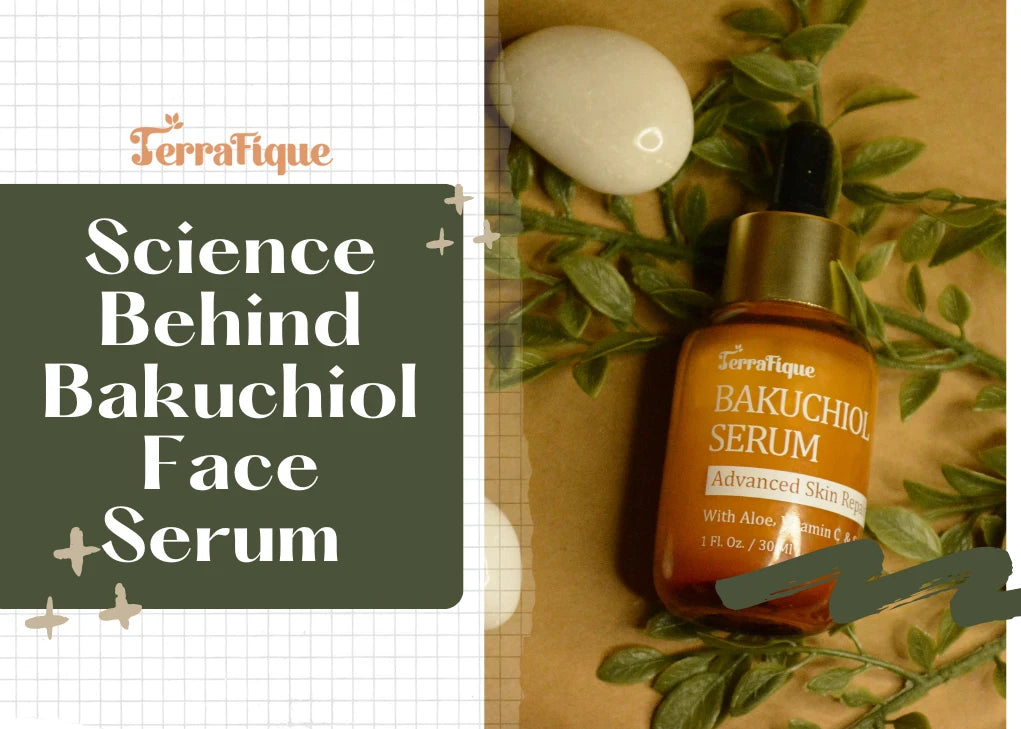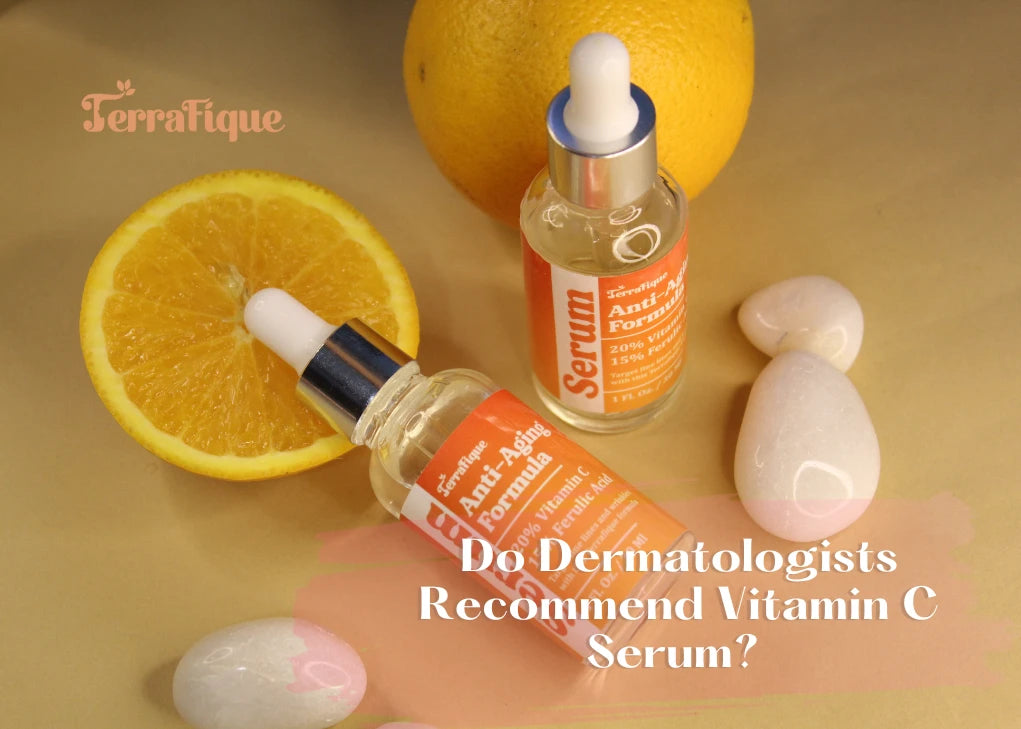Bakuchiol, a skincare ingredient that’s recently risen in popularity, is often compared to retinol because of its similar benefits. Both are revolutionary skincare ingredients. Bakuchiol and retinol help treat acne, scars, fine lines, wrinkles, pigmentation, large pores, and skin tone.
Though retinol has been the standard in anti-aging treatments for a long time, bakuchiol is challenging the status quo.
Should you switch to bakuchiol?
We’re giving you the best comparative analysis of bakuchiol face serum vs. leading retinol products so you can make an informed decision. Let’s jump right in!
Source of Ingredients

When it comes to the source of ingredients, retinol and bakuchiol couldn’t be more different. Retinol is a vitamin A derivative that can be produced synthetically or derived from animal products. In contrast, bakuchiol is derived from the leaves and seeds of the Psoralea corylifolia plant, sometimes called the babchi plant.
Bakuchiol has been a common ingredient in ancient Indian and Chinese traditional medicine. Meanwhile, retinol is more common in today’s cosmetic products.
Mechanism of Action

Both have potent anti-aging properties but the mechanisms of action are different for each.
Retinol is known to bind to and activate the retinoid receptors in the skin whereas bakuchiol only acts on the retinoid receptors. You may have deduced by now that retinoid receptors are the key actors behind the regulation of cell growth. They’re responsible for the anti-aging effects of retinol and bakuchiol.
A study published in the British Journal of Dermatology confirms both products’ effectiveness in reducing wrinkle surface area and hyperpigmentation. But it also established that bakuchiol requires 2 applications a day while retinol only needs to be applied once to achieve the same results.
This confirms a clear difference in both ingredient’s potency due to their different mechanisms of action on retinoid receptors.
Effect and Efficacy

Retinol and bakuchiol deliver the great results they promise. Both boost collagen production and promote skin renewal. They’re effective in treating breakouts, fading dark spots, and reducing the appearance of wrinkles.
In addition, these ingredients also help neutralize free radicals, protecting the skin from oxidative stress and premature aging while promoting healthy-looking skin.
Bakuchiol, on the other hand, displays a broader antioxidant profile than retinol. This is because bakuchiol also contains anti-inflammatory and antibacterial properties. It helps soothe inflammation and kill microorganisms that lead to clogged pores and increased sebum production, thereby reducing acne. Bakuchiol also helps balance the skin’s pH.
Its benefits don’t end there. Bakuchiol also tightens pores and protects the skin against damage from environmental stressors such as pollution.
Finally, this plant-derived ingredient offers moisturizing and hydrating properties. With regular application, you can keep your skin feeling smooth and supple.
Skin Type and Compatibility

Retinol is unsuitable for sensitive skin types. It also reacts with certain skincare ingredients like vitamin C and hydroxy acids.
In contrast, bakuchiol can be used no matter the skin type, even those with sensitive skin. Plus, bakuchiol can be combined with other skincare ingredients for better results.
Side Effects

The side effects of retinol are a major drawback. From dryness and redness to peeling and irritation, retinol comes with many side effects. It’s particularly bad for those with sensitive skin.
The main reason for these drawbacks is retinol’s strong purging effect on the skin. It promotes increased cell turnover which leads to acne and breakouts during the first 4 to 5 weeks of use. Thankfully, retinol’s side effects are temporary.
Even its long-term use is known to be problematic because it makes the skin more sensitive to sunlight.
Additionally, studies have shown that using retinol near the eyes can lead to dry eye syndrome and chronic irritation of the eyelids.
By comparison, there are very few side effects of bakuchiol. Any side effects are relatively milder than retinol. Bakuchiol doesn’t irritate the skin as much while its use rarely leads to redness.
While retinol should be discontinued during pregnancy and nursing, bakuchiol can be used on the skin with your OB-GYN’s approval.
All things considered, bakuchiol is much safer than retinol.
Although both products are generally safe to use, always conduct a patch test before using any skincare ingredient for the first time. In addition, start with lower concentrations and gradually increase the amount while monitoring how your skin reacts. You can discover the best dosage for your skin with this method. Of course, your dermatologist’s advice always takes precedence.
Application

Retinol is photosensitive, which means it degrades under sun exposure. Hence, retinol should only be applied at night.
Bakuchiol, a natural alternative to retinol, is much easier to apply. You can use it in the morning and at night. Unlike retinol, the product doesn’t deteriorate under sunlight.
Note that both products should be used after cleansing and toning skincare routines and before the application of heavier creams and oils.
Cost

Depending on the product type, percentage of ingredients used, and other factors, the price of retinol and bakuchiol serum can vary widely.
Both products are available at affordable and premium price points. However, retinol products are generally cheaper than the best bakuchiol products since bakuchiol is still considered a niche product with a smaller market.
Storage

Retinol products need to be stored in the fridge because they can easily become unstable when exposed to light and heat. Bakuchiol is more stable and only requires a cool, dark place for storage.
When it comes to shelf life, bakuchiol is once again the clear winner.
Verdict

We have to admit that retinol and bakuchiol are great skincare ingredients that deliver on their promises. It’s not easy to pick a winner because it all comes down to personal preferences and needs.
If we had to pick only one skincare ingredient, we’d recommend bakuchiol every time because it’s gentler and has fewer side effects. Although retinol can lead to dramatic results, we don’t relish the idea of a month-long acne breakout just to get here. Besides, the long-term side effects of retinol are pretty serious and require more adjustment from users.
For people with sensitive skin and those who want to use other skincare products, bakuchiol is again the better choice because it’s milder and works well with other skincare ingredients.
Bakuchiol might work more slowly than retinol but it can be used twice a day. Plus, its long-term results are more natural as it nurtures your skin from within.
Overall, bakuchiol is the clear winner of our comparative analysis of bakuchiol face serum vs. leading retinol products spec. Its efficacy is great though it isn’t as potent as retinol. Based on the other factors we mentioned, bakuchiol takes the prize.
However, keep in mind that not all bakuchiol products are equal. The concentration of active ingredients should be considered too. One formulation that allows users to take full advantage of the ingredient’s benefits is Terrafique’s Bakuchiol Face Serum. Bakuchiol’s potency is complemented by other skin-loving ingredients like witch hazel, vitamin C, ferulic acid, aloe vera, spirulina, and more. It has a ton of great reviews on the website plus a 30-day money-back guarantee, making your purchase virtually risk-free.
Bakuchiol vs retinol—which is better? These two powerhouse ingredients offer anti-aging effects but if you’re looking for a topical skincare treatment that’s milder, more versatile, and won’t make your skin purge, go for bakuchiol. Derived from the babchi plant, it’s easier to use and offers more benefits.





